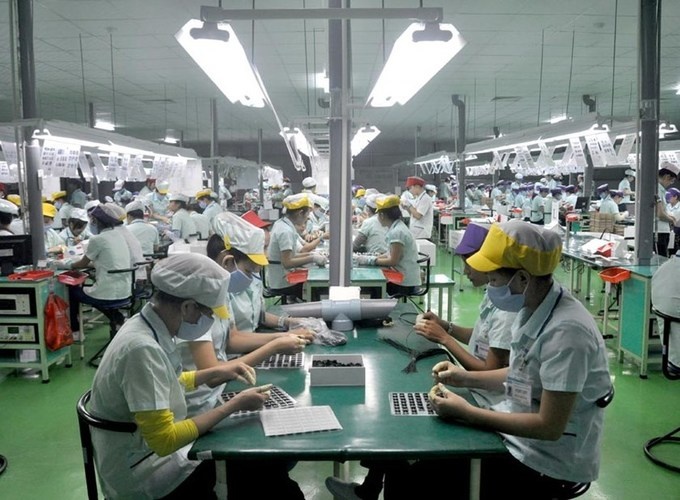
Solar panel manufacturer Jinko Solar Vietnam in the northern province of Quang Ninh is looking for 5,000-8,000 workers, with most of them required to have basic Chinese communication skills. So far, less than 1,000 have been hired.
“Manufacturing workers, technicians, quality control managers, we need them all. But not many suitable candidates are available,” said Dang Tran Hoang Anh, an HR officer with the company.
As one of the world’s largest solar panel manufacturers, Shanghai-based Jinko entered Vietnam in 2020, and is looking for people in 40 different job categories to make high-quality products that are shipped to Europe.
Anh said that Jinko pays well above average wages to secure the best talents in Vietnam. He just hired a worker who can speak Chinese fluently for a monthly salary of VND29 million ($1,263), 70 percent higher than what she was being paid at her old company.
“We want the best Vietnamese workers who can communicate in Chinese to complete many projects.”
Jinko is one of many companies that are scrambling to find Chinese-speaking Vietnamese workers as they set up factories in Vietnam to take advantage of the country’s low labor cost and export potential. Higher costs and risks in China, including its trade war with the U.S., motivated companies from many countries to make a shift to Vietnam.
Taipei-based electronics manufacturer Wistron Infocomm in the northern province of Ha Nam is recruiting people for 10 job categories including project management consultants, procurement officers and engineers, with most of them required to have basic or fluent Chinese language skills. Car tire manufacturer Jinyu Tires in the southern province of Tay Ninh is looking for 50 students who can speak Chinese for a training program to find the best future employees.
Popular recruitment platforms VietnamWorks and JobStreet have 140-200 job postings for Chinese-speaking candidates, mostly as procurement officers, quality control managers and engineers. The recruitment rush for Chinese-speaking workers began at the end of last year and grew stronger in the first quarter, with strong demand seen in northern industrial hubs, said Ngo Thi Ngoc Lan, northern region director at recruitment firm Navigos Search.
The provinces of Bac Ninh and Bac Giang have a large supply of workers who can speak Chinese, but companies are seeing strong competition for them, she said. In the provinces of Phu Tho and Quang Ninh, there is less competition but it is more difficult to recruit high-skilled workers, she added. China has consistently been among the top 10 foreign direct investors in Vietnam in recent years.
Mainland China ranked fourth in registered capital in the first four months at over $1.07 billion, while Hong Kong and Taiwan secured the seventh and eighth places. Together, the three territories registered $2.1 billion in capital, second only to Singapore at $3.1 billion. China’s Goertek Vina, one of the key suppliers for Apple, increased its investment in Vietnam by $306 million to over $565 million this March.
The company had nearly 28,000 workers in its plant in the northern province of Bac Ninh as of February, up from an average 23,000 last year. Another 5,000 jobs will be added when its plant in the central province of Nghe An begins operations in June, and by 2023, it will have 30,000 employees. Another Apple supplier, Foxconn, said last year that it would pour an additional $700 million into its Vietnam operations on top of its $1.5 billion investment.
Lan said that U.S.-China tensions, which began several years ago, have pushed many Chinese companies to move to Vietnam, generating a large demand for local employees. Chinese employees have higher requirements than Vietnamese peers in terms of salary and benefits, so it is more cost-effective to hire Vietnamese, she added.
She predicted that the trend of recruiting Chinese-speaking Vietnamese in factories will keep rising for at least five more years.
“This will surely encourage workers and students to learn Chinese as they see the career potential.”
At present, however, finding Chinese-speaking Vietnamese people is not easy. Anh of Jinko said it was difficult to find suitable Chinese-speaking candidates because many do not want to move from Hanoi to Quang Ninh to work.
“We have to train most candidates, either in Chinese or in their professional skills, to get the people we need.”
Lan said that companies are also seeing challenges in recruiting because candidates either have the professional skills and lack language fluency or vice versa. Some companies also want employees to be able to speak English, she added.
Chinese firms offer salaries that are 40-50 percent lower than European and American companies, while requiring employees to work on Saturdays. These are some drawbacks that discourage candidates, she said.
Jinko Solar Vietnam used to have Chinese nationals account for 70 percent of its employees in Vietnam, but the company has reduced the ratio to 50 percent now, because Chinese staff often work for six to 12 months and return to home. The factory, meanwhile, needs long-term personnel.
“We are offering salary of up to VND70 million a month for some directors’ jobs, and we only want Vietnamese candidates.”

